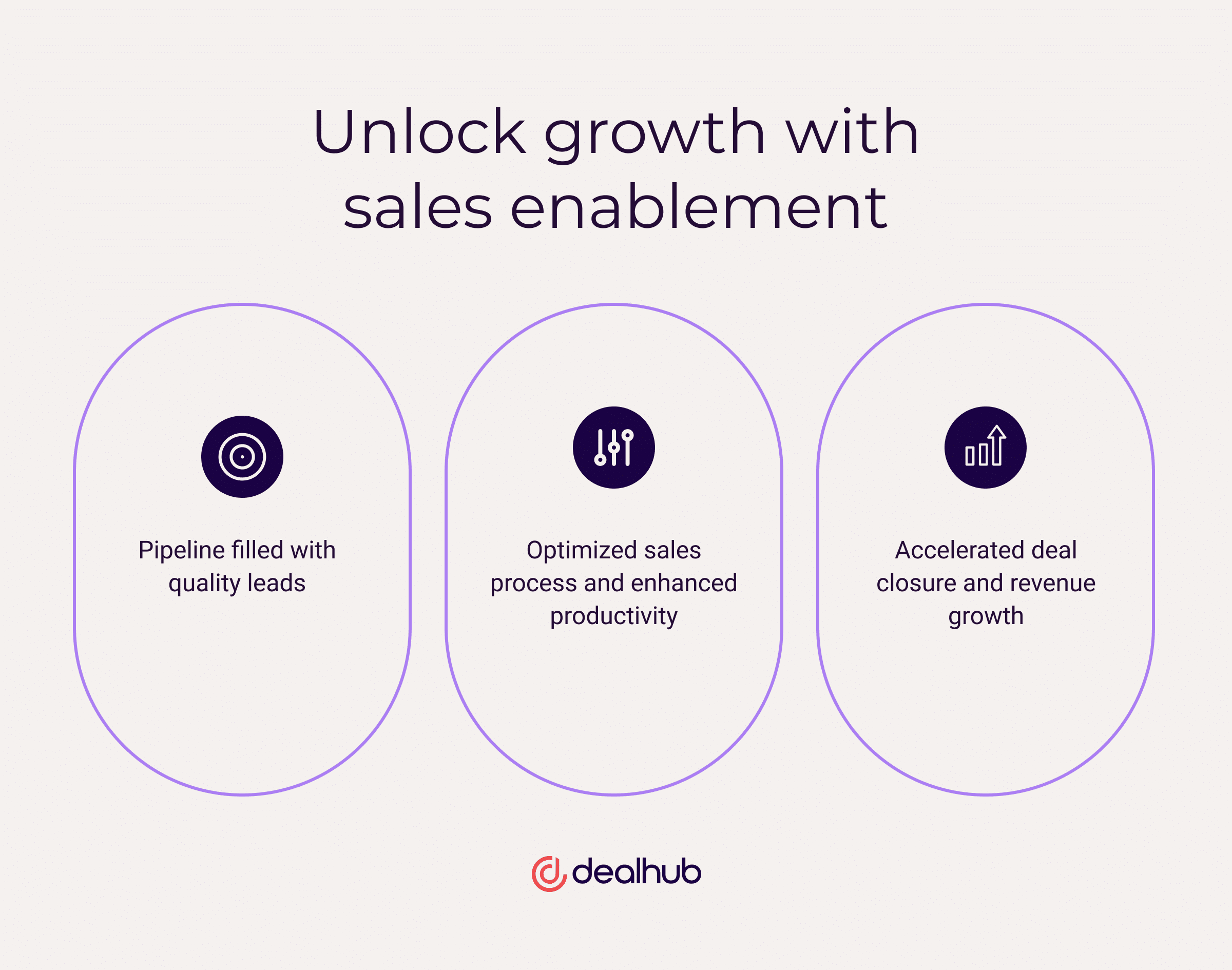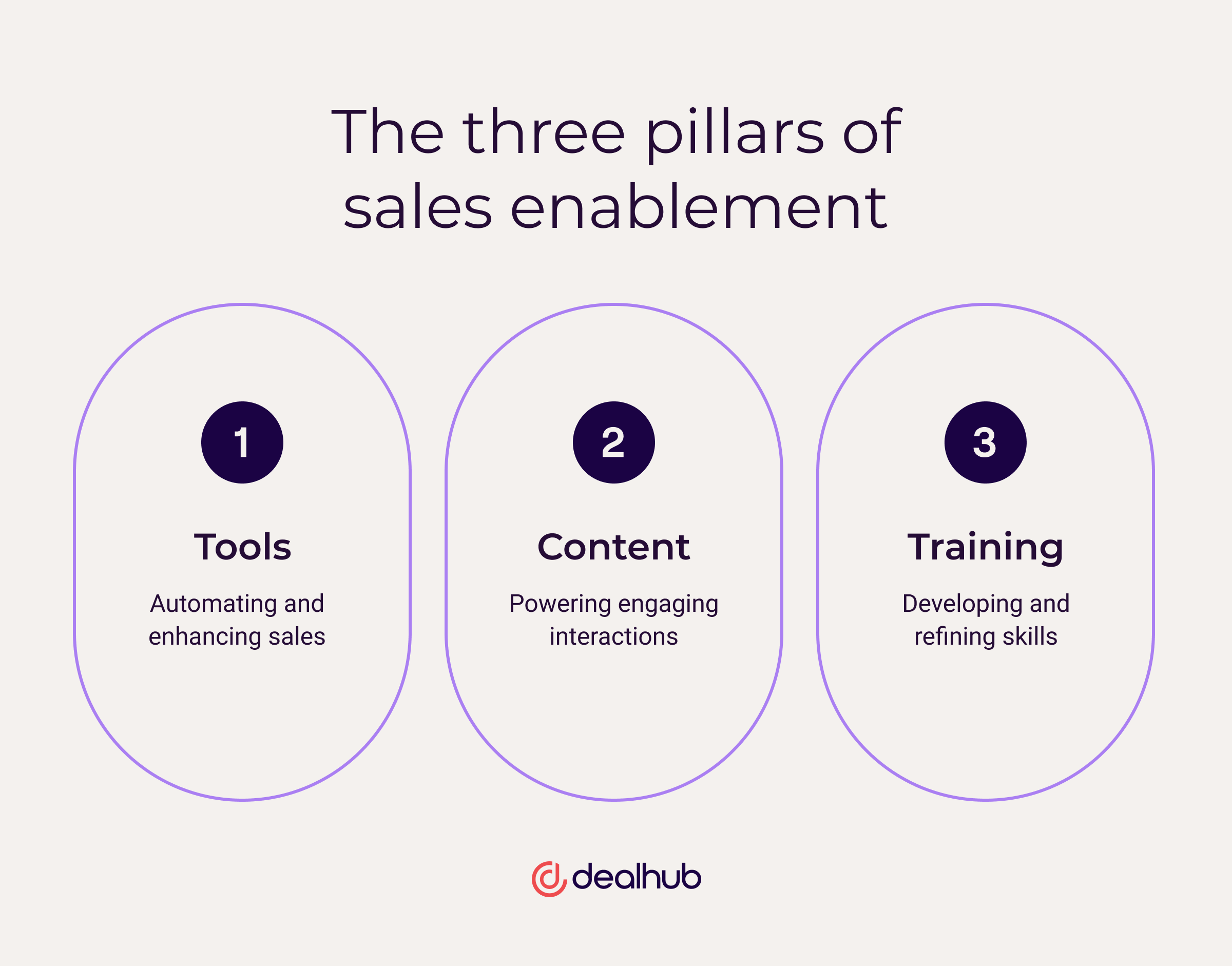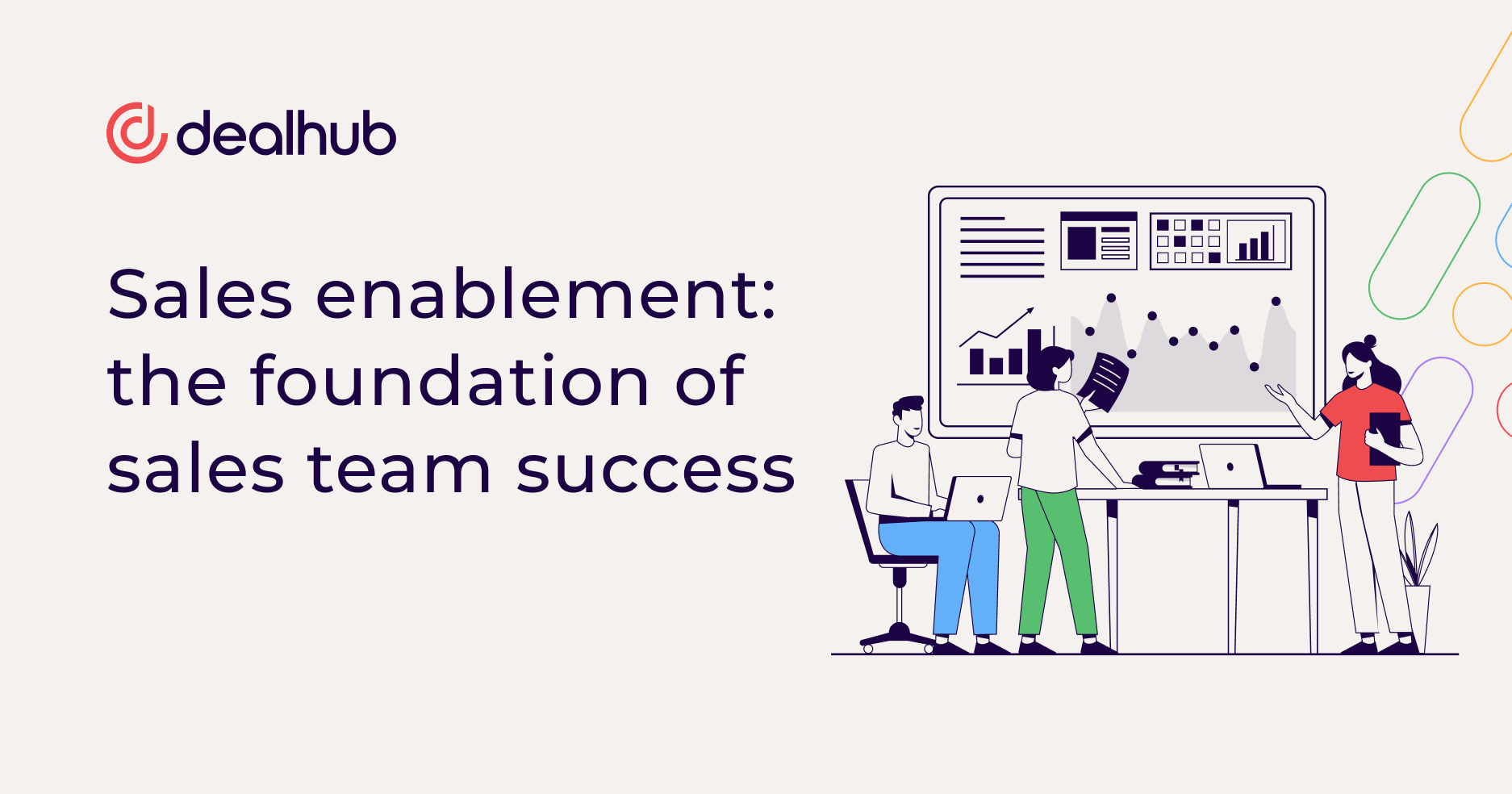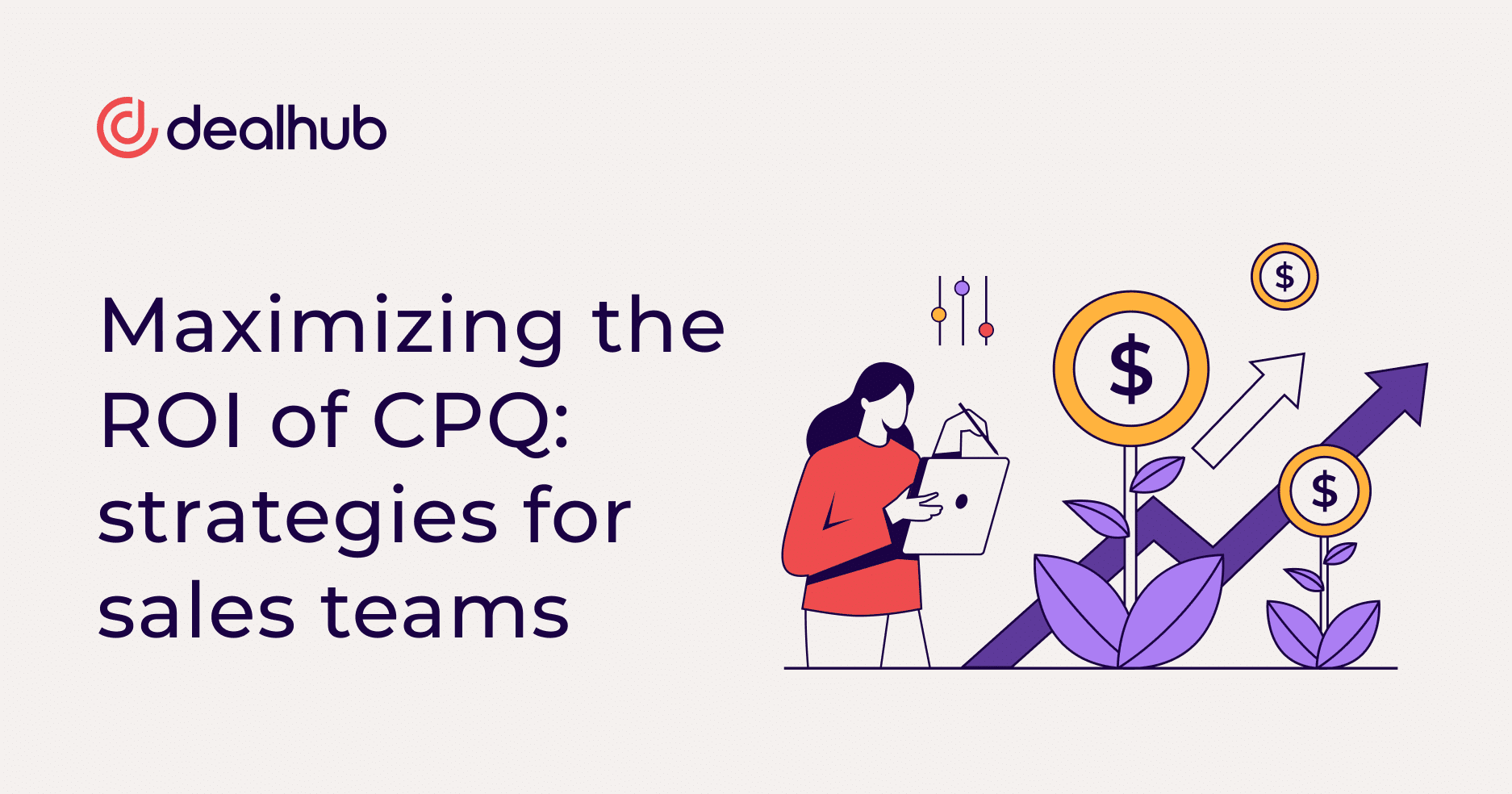Sales enablement is essential to revenue growth
Sales enablement is more than just an industry buzzword. It’s the secret sauce that fuels revenue growth within B2B organizations. If you aren’t yet taking advantage of it, you’re missing out on an opportunity to ramp up sales. Your sales enablement teams can produce remarkable outcomes with proper nurturing of sales strategies. For example, an effective sales enablement strategy will ensure teams achieve the following:

- Effectively engage prospects and fill the pipeline with high-quality leads: Sales enablement equips your sales leaders with the right tools, content, and training to effectively engage prospects. By providing sales representatives with valuable insights, competitive intelligence, and targeted messaging, sales organizations can more effectively build rapport with potential buyers and position themselves as industry experts. This, in turn, assists in filling the pipeline with high-quality leads your sales teams can nurture, leading to a higher chance of conversion.
- Improve sales process efficiency and sales team productivity: The right sales enablement strategy optimizes the sales process, making it more efficient and streamlined. You give your sales teams the gift of time by eliminating manual tasks, automating administrative work, and providing intuitive sales tools. With less time spent on non-selling activities, sales can focus on what it does best: building relationships and closing deals. Increased productivity leads to more revenue-generating opportunities.
- Close more deals and grow revenue: At the end of the day, sales enablement is all about driving revenue growth. Arming your sales teams with the necessary resources gives them the confidence and knowledge to close deals effectively. From personalized presentations to persuasive case studies, sales enablement ensures that your teams have engaging, informative content at their fingertips. These resources have the power to turn a customer’s doubt into resounding confidence to move from “maybe” to “yes.”
Building a solid foundation: The three pillars of sales enablement
To establish a strong sales enablement strategy, you need a solid foundation. This foundation will build confidence among your sales representatives and give them everything they need to convince clients that your product is exactly what they need. The foundation for sales enablement is built on three pillars: tools, content, and training.

Tools
Having tools for sales enablement builds the backbone of an efficient sales process. They automate repetitive tasks, centralize information, and provide valuable analytics. Whether it’s a customer relationship management (CRM) system, a sales engagement platform, automated billing, or a knowledge base, the right tools empower your teams to work smarter, not harder. It also reduces the likelihood of manual errors and provides the means to make outreach meaningful and engaging for both customers and sales representatives.
Content
Compelling and relevant content is the fuel that powers successful sales engagements. Sales enablement ensures that your teams have access to a rich repository of content that aligns with the customer’s journey. From sales collateral and case studies to blog articles and video testimonials, content equips your teams to make a lasting impact on prospects.
Training
Sales professionals need continuous training to stay on top of their game. Sales enablement programs provide targeted training that focuses on:
- enhancing skills
- improving product knowledge
- refining sales techniques
Whether through interactive workshops, online courses, or mentorship programs, training enables your sales teams to evolve and adapt to the ever-changing sales landscape.
Sales enablement’s role in empowering growth
Once you have a strong foundation of internal training, tools, and content, you will be poised to empower growth throughout the organization. This includes building processes that ensure marketing, sales, and customer success teams work more closely towards a common revenue goal. Let’s take a closer look.
Aligning cross-functional teams
Sales enablement facilitates collaboration between departments, including sales, marketing, and customer success teams. By aligning these cross-functional teams, you create a cohesive customer experience and ensure that messaging remains consistent across all touchpoints. Sales enablement breaks down silos and provides a steady consistent customer experience along the buyer’s journey. This alignment enhances the effectiveness of everything from marketing campaigns and sales engagements to post-sale customer support, ultimately driving revenue growth.
Enhancing content creation
Sales enablement brings sales and marketing teams together to co-create content that resonates with prospects. Sales representatives constantly interact with current and potential customers, allowing them to gain valuable insights regarding what’s working and what’s not. By leveraging the frontline knowledge of your sales teams, marketing can develop targeted content that addresses specific pain points and objections. This collaboration results in content that speaks directly to the needs of your target audience while establishing brand credibility and product knowledge while supporting the sales process.
Increasing sales efficiency
Sales enablement optimizes processes, streamlines workflows, and eliminates bottlenecks. It provides sales teams with the resources they need to be efficient, including customer relationship management (CRM) and configure, price, quote (CPQ) platforms. These tools automate administrative tasks, reduce manual effort, and enhance the efficiency of the sales process. With a more streamlined process, sales teams can focus their time and energy on sourcing prospects, building relationships, engaging with current/future clients, and closing deals, resulting in accelerated revenue growth.
Empowering sales teams
Sales enablement empowers sales teams in multiple ways:
- It provides coaching and mentorship opportunities to develop talent and nurture the skills of individual team members. By offering guidance, feedback, and personalized support, sales enablement programs support sales professionals so that they can improve their performance, build confidence, and excel in their roles.
- It offers sales training programs that keep teams updated with industry trends, product knowledge, and selling techniques. Well-trained teams continuously build on their knowledge base and expertise to refine complex sales cycles and effectively address customer needs.
- Sales enablement equips sales teams with suitable processes and tools to make their jobs easier. With sales playbooks, objection-handling frameworks, data-driven analytics, and guided selling tools, sales enablement ensures that teams have the resources to engage with potential clients, make informed decisions, and close deals.
It can also be a valuable recruitment tool. If you want to source the best and brightest in sales, you’ll want to show potential new hires that you’re internally investing in the infrastructure, tools, support, and cutting-edge strategies that will encourage them to excel.
Building visibility into sales performance
Sales enablement provides real-time insights and analytics that enable organizations to effectively monitor and evaluate sales performance via relevant KPIs. By tracking key metrics, such as pipeline velocity, conversion rates, and deal sizes, businesses can identify areas for improvement, spot obstructions, and make data-driven decisions to optimize sales processes. This visibility into sales performance allows organizations to allocate resources effectively, identify high-performing sales professionals, and replicate successful strategies, leading to increased revenue growth.
Improving retention of sales professionals
When organizations provide coaching, training, and the right tools to support sales teams, it enhances job satisfaction and fosters a culture of continuous improvement. Individuals on sales teams who feel valued and equipped to excel in their roles are likelier to stay with the organization. This reduces turnover and maintains a stable and high-performing sales force that continues to develop a deeper understanding of your brand. Retaining experienced sales professionals allows companies to more efficiently scale sales operations and contributes to long-term revenue growth and customer satisfaction.
Drive revenue with an effective sales enablement strategy
Sales enablement is the foundation of sales team success. It provides the tools, content, and training necessary to engage prospects, improve productivity, and close deals. With a robust sales enablement strategy that aligns sales, marketing, and customer success teams, you’ll have a coherent buyer’s journey to effectively engage with prospects and clients. By investing in sales enablement, your sales teams will soar to new heights, allowing your organization to achieve its revenue goals and stay ahead in the competitive B2B landscape.





